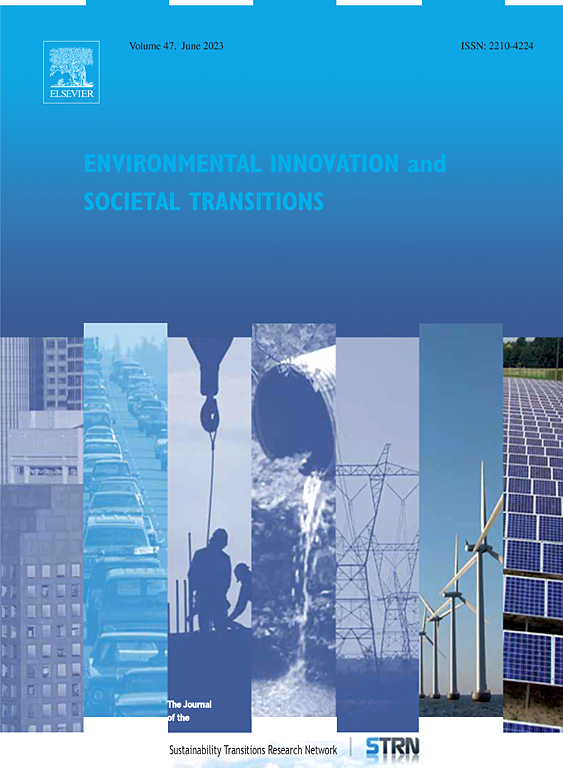食品系统转型中的商业模式创新:发酵企业的探索性案例研究
IF 6.1
2区 经济学
Q1 ENVIRONMENTAL SCIENCES
Environmental Innovation and Societal Transitions
Pub Date : 2025-07-14
DOI:10.1016/j.eist.2025.101027
引用次数: 0
摘要
本文探讨了新技术企业如何在动态转型背景下创新其商业模式。通过对欧洲生物质和精密发酵行业新兴生物技术公司的案例研究,我们分析了公司如何采用适应-符合和拉伸-转化的方法来实现多维商业模式设计空间的可塑边界。从概念上讲,我们的研究通过整合生态维度来推进这一分析框架,为商业模式创新提供了更广泛的社会-技术-生态视角。实证研究发现,企业通过循环价值交付实践拓展和改造生态边界。我们还发现,企业适应并顺应市场;用户专注于低成本的价值主张。此外,我们发现技术创新和商业模式创新是紧密相连的,这挑战了之前将它们区分开来的商业模式设计空间研究。该论文增加了一个日益增长的文献,整合了企业和系统层面的观点,可持续发展的转变。本文章由计算机程序翻译,如有差异,请以英文原文为准。
Business model innovation in food system transitions: An exploratory case study of fermentation firms
This paper explores how new technology-based firms innovate their business models in a dynamic transitions context. Through a case study of emerging biotech firms in the European biomass and precision fermentation industries, we analyze how firms adopt fit-and-conform and stretch-and-transform approaches to the malleable boundaries of a multi-dimensional business model design space. Conceptually, our study advances this analytical framework by integrating an ecological dimension, offering a broader socio-techno-ecological perspective on business model innovation. Empirically, we find that firms stretch-and-transform the ecological boundary through circular value delivery practices. We also find that firms fit-and-conform to the markets & users boundary by focusing on low-cost value propositions. In addition, we find that technological and business model innovation are deeply interconnected, challenging prior business model design space studies treating them as more distinct. The paper adds to a growing literature that integrates firm- and system-level perspectives on sustainability transitions.
求助全文
通过发布文献求助,成功后即可免费获取论文全文。
去求助
来源期刊

Environmental Innovation and Societal Transitions
Energy-Renewable Energy, Sustainability and the Environment
CiteScore
13.60
自引率
19.40%
发文量
90
审稿时长
56 days
期刊介绍:
Environmental Innovation and Societal Transitions serves as a platform for reporting studies on innovations and socio-economic transitions aimed at fostering an environmentally sustainable economy, thereby addressing structural resource scarcity and environmental challenges, particularly those associated with fossil energy use and climate change. The journal focuses on various forms of innovation, including technological, organizational, economic, institutional, and political, as well as economy-wide and sectoral changes in areas such as energy, transport, agriculture, and water management. It endeavors to tackle complex questions concerning social, economic, behavioral-psychological, and political barriers and opportunities, along with their intricate interactions. With a multidisciplinary approach and methodological openness, the journal welcomes contributions from a wide array of disciplines within the social, environmental, and innovation sciences.
 求助内容:
求助内容: 应助结果提醒方式:
应助结果提醒方式:


